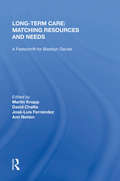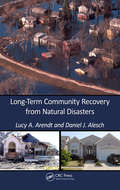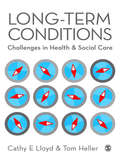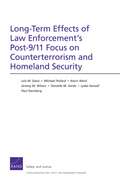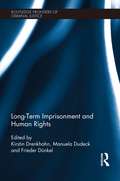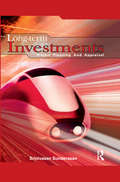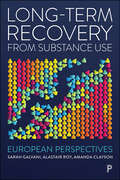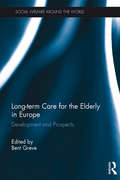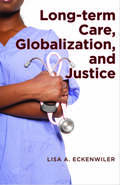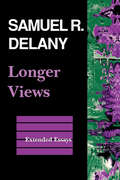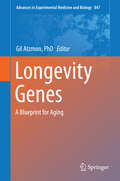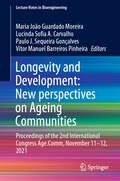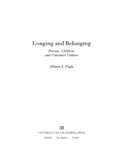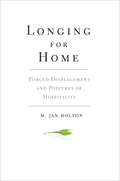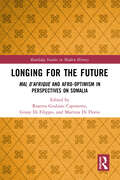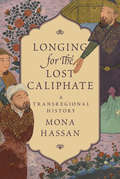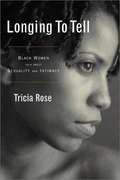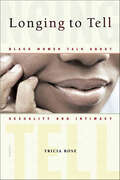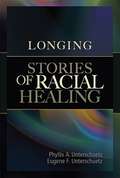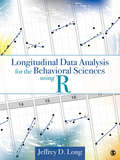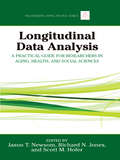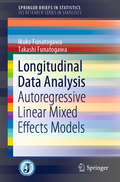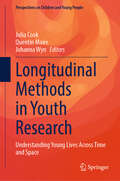- Table View
- List View
Long-Term Care: Matching Resources And Needs (In Association With Pssru (personal Social Services Research Unit) Ser.)
by David ChallisImproving equity and efficiency in the long-term care of older people is an international concern, with governments attempting to ensure that policies and practice develop so that resources are used to best effect. This requires good quality evidence founded on sound theory. This volume honours the outstanding contribution of Bleddyn Davies to this field, bringing together perspectives of scholars and practitioners from many countries including the UK, Australia, Hong Kong, Japan, Sweden and the USA. Contemporary policy dilemmas are considered, leavened by professional anecdote. A chapter from Davies himself, reflecting on the origins of the PSSRU (Personal Social Services Research Unit), concludes the volume that also features a full listing of his books and monographs, which will prove invaluable to those seeking to engage with his contribution to the field. This volume will greatly interest academics in social policy, social work, gerontology and social care as well as professionals in the field.
Long-Term Community Recovery from Natural Disasters
by Lucy A. Arendt Daniel J AleschToday, governmental efforts at long-term community recovery from a natural disaster consist primarily of rebuilding the physical artifact of the community. This entails reestablishing vital community services and infrastructure and creating housing to replace that which has been lost. While restoring the built environment of a disaster area is esse
Long-Term Conditions: Challenges in Health & Social Care
by Cathy E. Lloyd Tom HellerSome people have always had to find ways of living with long term conditions such as diabetes or coeliac disease, but as people live longer, increasing numbers of us now experience long-term poor health. While some conditions that previously limited the length of life are manageable a growing number of people live with long-term conditions. Against this backdrop, Long Term Conditions explores the complex issues surrounding the experience of long-term illness and the enormous pressure this puts on individuals, their families and carers and on health and social care services. The perspectives of each of these groups are voiced within this book, with chapters written by people who use health and social care services, carers, policy-makers and practitioners. Using a variety of research methods to get to the heart of the matter, the book probes assumptions about the experience of long-term poor health and what constitutes good care. Its aim is to challenge readers to think critically about existing policy and provision and to inspire change based on sound evidence and a drive towards greater multi-professional working. Long Term Conditions provides academics, practitioners and students with a thorough grounding in the complex issues surrounding the experience and management of long-term illness. It is an ideal text for courses on policy, management and practice in health and social care.
Long-Term Effects of Law Enforcement's Post-9/11 Focus on Counterterrorism and Homeland Security
by Lois M. Davis Jeremy M. Wilson Michael Pollard Danielle M. Varda Kevin WardIn the aftermath of 9/11, many law enforcement agencies (LEAs) shifted more resources toward developing counterterrorism (CT) and homeland security (HS) capabilities. This volume examines the effects the focus on CT and HS has had on law enforcement since 9/11, including organizational changes, funding mechanisms, how the shift has affected traditional crime-prevention efforts, and an assessment of benefits, costs, and future challenges.
Long-Term Imprisonment and Human Rights (Routledge Frontiers of Criminal Justice)
by Frieder Dünkel Kirstin Drenkhahn Manuela DudeckPrisons and imprisonment have become a commonplace topic in popular culture as the setting and rationale for fiction and documentaries and most people seem to have a clear notion of what it is like in prison, ranging from the idea of the prison cell as a cosy nook with fast internet access to that of a dungeon with a hard bed and a diet of bread and water. But what is prison really like? Do prisoners have the same rights as everyone else? What are the similarities and differences between prisons in different European countries? This book answers all of these questions, whilst also presenting cutting-edge research on the living conditions of long-term prisoners in Europe and considering whether these conditions meet international human rights standards. Bringing together leading experts in the field, with comprehensive coverage of the issues in Belgium, Croatia, Denmark, England, Finland, France, Germany, Lithuania, Poland, Spain and Sweden, this book offers the first comparative study on the subject. Whereas past research in this area has concentrated on the Anglo-American experience, this book offers a truly comparative European approach and pays due attention to the differences in prison systems between the post-Soviet countries and continental Europe. This book will be key reading for academics and students of criminology, criminal justice and penology and will also be of interest to students and practitioners of law.
Long-Term Investments: Project Planning and Appraisal
by Srinivasan SundarasanFirst published in 2009. The limited text material available to highlight the relationships among capital structure, managerial incentives and valuation has also constrained teaching efforts at business schools. Long-term Investments is intended to give a bird’s eye view of projects for a diverse audience encountered at contemporary business schools. This book is an attempt to blend the theory from Corporate Finance courses with the real-world situations encountered by a project analyst. It provides a systematic ‘guided-tour’ of the world of projects commencing with a strategic view, through the development of financial models and culminates with an evaluation of risk and the design of risk-mitigation measures. Given the emphasis on the development of financial models to help make investment decisions, it is designed to simultaneously appeal to business school students and to serve as a do-it-yourself guide for practicing professionals.
Long-Term Recovery from Substance Use: European Perspectives
by Sarah Galvani, Alastair Roy and Amanda ClaysonIn this much-needed text, leading international experts explore crucial aspects of people’s experience of long-term recovery from substance use. Centred around the voices of people who use substances, the book examines the complex and continuing needs of people who have sought to change their use of substances, investigating the ways in which personal characteristics and social and systemic factors intersect to influence the lives of people in long-term recovery. With perspectives from Sweden, Norway, Germany, Belgium, Iceland and the United Kingdom, it also considers the role and needs of family members, and puts forward clear recommendations for improving future research, policy and practice.
Long-term Care for the Elderly in Europe: Development and Prospects (Social Welfare Around the World)
by Bent GreveLong-term care is an increasingly important issue in many contemporary welfare states around the globe given ageing populations. This ground-breaking book provides detailed case studies of 11 EU-member states’ welfare regimes within Europe to show how welfare states organize, structures and deliver long-term care and whether there is a social investment perspective in the delivery of long-term care. This perspective is important because the effect of demographic transitions is often used as an argument for the existence of economic pressure on welfare states and a need for either direct retrenchment or attempts to reduce welfare state spending. The book’s chapters will look specifically into how different welfare states have focussed on long-term care in recent years and what type of changes have taken place with regard to ageing populations and ambitions to curb increases in public sector spending in this area. They describe the development in long-term care for the elderly after the financial crisis and also discuss the boundaries between state and civil society in the different welfare states' approaches to the delivery of care.
Long-term Care, Globalization, and Justice
by Lisa A. EckenwilerLong-term care can be vexing on a personal as well as social level, and it will only grow more so as individuals continue to live longer and the population of aged persons increases in the United States and around the world. This volume explores the ethical issues surrounding elder care from an ecological perspective to propose a new theory of global justice for long-term care.Care work is organized not just nationally, as much current debate suggests, but also transnationally, through economic, labor, immigration, and health policies established by governments, international lending bodies, and for-profit entities. Taking an epistemological approach termed "ecological knowing," Lisa A. Eckenwiler examines this organizational structure to show how it creates and sustains injustice against the dependent elderly and those who care for them, including a growing number of migrant care workers, and how it weakens the capacities of so-called source countries and their health care systems. By focusing on the fact that a range of policies, people, and places are interrelated and mutually dependent, Eckenwiler is able not only to provide a holistic understanding of the way long-term care works to generate injustice but also to find ethical and practicable policy solutions for caring for aging populations in the United States and in less well-off parts of the world.Deeply considered and empirically informed, this examination of the troubles in transnational long-term care is the first to probe the issue from a perspective that reckons with the interdependence of policies, people, and places, and the first to recommend ways policymakers, planners, and families can together develop cohesive, coherent long-term care policies around the ideal of justice.
Longer Views: Extended Essays
by Samuel R. Delany Ken James"Reading is a many-layered process -- like writing," observes Samuel R. Delany, a Nebula and Hugo award-winning author and a major commentator on American literature and culture. In this collection of six extended essays, Delany challenges what he calls "the hard-edged boundaries of meaning" by going beyond the customary limits of the genre in which he's writing. By radically reworking the essay form, Delany can explore and express the many layers of his thinking about the nature of art, the workings of language, and the injustices and ironies of social, political, and sexual marginalization. Thus Delany connects, in sometimes unexpected ways, topics as diverse as the origins of modern theater, the context of lesbian and gay scholarship, the theories of cyborgs, how metaphors mean, and the narrative structures in the Star Wars trilogy."Over the course of his career," Kenneth James writes in his extensive introduction, "Delany has again and again thrown into question the world-models that all too many of us unknowingly live by." Indeed, Delany challenges an impressive list of world-models here, including High and Low Art, sanity and madness, mathematical logic and the mechanics of mythmaking, the distribution of wealth in our society, and the limitations of our sexual vocabulary. Also included are two essays that illustrate Delany's unique chrestomathic technique, the grouping of textual fragments whose associative interrelationships a reader must actively trace to read them as a resonant argument. Whether writing about Wagner or Hart Crane, Foucault or Robert Mapplethorpe, Delany combines a fierce and often piercing vision with a powerful honesty that beckons us to share in the perspective of these Longer Views.
Longevity Genes
by Gil AtzmonThe release of the complete version of the human genome sequence in 2003 has paved the way for defining gene function and genetic background for phenotypic variation in humans and allowed us to study the aging process in a new light. This new volume results from that research and focuses on the genetic and epigenetic process of aging. While the interpretation of the genome data is still in its initial stages, this new volume looks at the evolving understanding of molecular mechanisms involved in cellular processes, gene function associated with complex traits, epigenetic components involve in gene control and the creation of hypothesis-free genome-wide approaches. Longevity Genes: A Blueprint for Aging explores the genetic and genomic elements that can maintain a long life such as DNA damage mechanisms, epigenetics and the way we can use this knowledge to generate customized treatments. It touches on some of the multidisciplinary approaches as well as genomic-wide association technology used to analyze complex traits. This book describes the hunt for genes affecting complex traits using a high throughput technology, with adequate consideration for the selection of an appropriate population, applications of statistical genetics and computational biology, and most importantly, considering phenotype-genotype association studies. Longevity Genes provides coverage of not only established aspects of genetics and aging, but also new approaches and perceptions in this important area of research.
Longevity and Development: Proceedings of the 2nd International Congress Age.Comm, November 11–12, 2021 (Lecture Notes in Bioengineering)
by Maria João Guardado Moreira Lucinda Sofia A. Carvalho Paulo J. Sequeira Gonçalves Vítor Manuel Barreiros PinheiraThis book focuses on the dynamic process of aging and on interventions to support the development of older and integrated societies, from a multidisciplinary point of view. Gathering contributions from researchers and professionals with different backgrounds, including social and health sciences, education, engineering and IT, biology, geography and environmental science, it aims at understanding the phenomenon of population aging, in order to contribute to the development of future functional communities, fostering well-being and autonomy of the elderly, their integration and participation. Based on the proceedings of the 2nd International Congress Age.Comm Longevity and Development, organised online on November 11-12, 2021, from Castelo Branco, Portugal, this book addresses a wide range of specialists dealing with the process of aging, integration and community development in the societies of the future.
Longford Folk Tales
by Philip ByrneLongford Folk Tales is a treasure trove of wonderful stories of saints and deities, fairies and devils, kings and ghosts, shoemakers and other engaging characters. Read about The Blake Millions, butter stealing, the Wooing of Étaín, and ‘The Walking Gallows’, Hempenstall – all your favourite legends and many more.This selection of tales and stories from every corner of the county of Longford reflects the wisdom of the countryside and its people. Legends, folk customs and local lore from earliest times up to the county’s more recent past are expertly told by storyteller Philip Byrne.
Longing For Running Water: Ecofeminism And Liberation
by Ivone Gebara David MolineauxGebara's succinct yet moving statement of her principles of ecofeminism shows how intertwined are the tarnished environment around her and the poverty that afflicts her neighbors. From her experiences with the Brazilian poor women's movement she develops a gritty urban ecofeminism and indeed articulates a whole worldview. She shows how the connections between Western thought, partriachal Christianity, and environmental destruction necessitate personal conversion to "an new relationship with the earth and with the entire cosmos."
Longing and Belonging: Parents, Children, and Consumer Culture
by Allison J. PughEven as they see their wages go down and their buying power decrease, many parents are still putting their kids' material desires first. These parents struggle with how to handle children's consumer wants, which continue unabated despite the economic downturn. And, indeed, parents and other adults continue to spend billions of dollars on children every year. Why do children seem to desire so much, so often, so soon, and why do parents capitulate so readily? To determine what forces lie behind the onslaught of Nintendo Wiis and Bratz dolls, Allison J. Pugh spent three years observing and interviewing children and their families. In Longing and Belonging: Parents, Children, and Consumer Culture, Pugh teases out the complex factors that contribute to how we buy, from lunchroom conversations about Game Boys to the stark inequalities facing American children. Pugh finds that children's desires stem less from striving for status or falling victim to advertising than from their yearning to join the conversation at school or in the neighborhood. Most parents respond to children's need to belong by buying the particular goods and experiences that act as passports in children's social worlds, because they sympathize with their children's fear of being different from their peers. Even under financial constraints, families prioritize children "feeling normal". Pugh masterfully illuminates the surprising similarities in the fears and hopes of parents and children from vastly different social contexts, showing that while corporate marketing and materialism play a part in the commodification of childhood, at the heart of the matter is the desire to belong.
Longing for Home: Forced Displacement and Postures of Hospitality
by M. Jan HoltonWhat is it about the concept of "home" that makes its loss so profound and devastating, and how should the trauma of exile and alienation be approached theologically? M. Jan Holton examines the psychological, social, and theological impact of forced displacement on communities in the Congo and South Sudan and on indigenous Batwa tribespersons in Uganda, as well as on homeless U. S. citizens and on U. S. soldiers returning from the wars in Afghanistan and Iraq. She draws on ethnographic work in Africa, extensive research in practical theology, sociology, and psychology, as well as on professional work and personal experiences in America and abroad. In doing so she explores how forced displacement disrupts one's connection with the home place and the profound characteristics it fosters that can help people lean toward flourishing spiritually and psychologically throughout their lifetime. Displacement invites a social alienation that can become deeply institutionalized, threatening the moral well being of us all. Longing For Home offers a frame for understanding how communities can respond to refugees and various homeless populations by cultivating hospitality outside of their own comfort zones. This essential study addresses an urgent interreligious global concern and Holton's thoughtful and compelling work offers a constructive model for a sustained practical response.
Longing for the Future: Mal D’Afrique and Afro-Optimism in Perspectives on Somalia (Routledge Studies in Modern History)
by Rosetta Giuliani Caponetto Giusy Di Filippo Martina Di FlorioThis volume focuses on a longing projected mostly toward the past (mal d’Afrique) alongside a longing toward the future (afro-optimism), and the different manifestations, shifting meanings, and potential points of contact of these two stances. The volume introduces a new perspective into the discussion of Somalia in Italian Studies. This is an intersectional work of Italian Studies scholarship, whose contributors help re-imagine the field and its relationship to Somalia with their diverse backgrounds, unique insights, and global breadth. The book integrates the current scholarship on Somalia with the most recent theoretical studies on nostalgia, visionary affect, colonial ruins, silenced archives, melancholy, ecology, food and diaspora, classical studies and performativity, storytelling, afro-fabulation and queer literature, media and humanitarianism, and afro optimism. The book will serve as an invaluable reference in multidisciplinary programs such as Global History, Africana Studies, Diaspora Studies, Migration Studies, Peace and Conflict Studies, Integrity and Global Studies, as well as Italian Studies and various core courses. Because of its interdisciplinary discussion of Somalia, the volume will draw the interest of a large readership among scholars, and non-scholars, from different disciplines and geographic affiliation.
Longing for the Lost Caliphate: A Transregional History
by Mona HassanIn the United States and Europe, the word "caliphate" has conjured historically romantic and increasingly pernicious associations. Yet the caliphate's significance in Islamic history and Muslim culture remains poorly understood. This book explores the myriad meanings of the caliphate for Muslims around the world through the analytical lens of two key moments of loss in the thirteenth and twentieth centuries. Through extensive primary-source research, Mona Hassan explores the rich constellation of interpretations created by religious scholars, historians, musicians, statesmen, poets, and intellectuals.Hassan fills a scholarly gap regarding Muslim reactions to the destruction of the Abbasid caliphate in Baghdad in 1258 and challenges the notion that the Mongol onslaught signaled an end to the critical engagement of Muslim jurists and intellectuals with the idea of an Islamic caliphate. She also situates Muslim responses to the dramatic abolition of the Ottoman caliphate in 1924 as part of a longer trajectory of transregional cultural memory, revealing commonalities and differences in how modern Muslims have creatively interpreted and reinterpreted their heritage. Hassan examines how poignant memories of the lost caliphate have been evoked in Muslim culture, law, and politics, similar to the losses and repercussions experienced by other religious communities, including the destruction of the Second Temple for Jews and the fall of Rome for Christians. A global history, Longing for the Lost Caliphate delves into why the caliphate has been so important to Muslims in vastly different eras and places.
Longing to Tell: Black Women Talk About Sexuality and Intimacy
by Tricia Rose<p>The Sexual Lives of Black Women, In Their Own Words <p>In a culture driven by sexual and racial imagery, very few honest conversations about race, gender, and sexuality actually take place. In their absence, commonly held perceptions of black women as teenage mothers, welfare recipients, mammies, or exotic sexual playthings remain unchanged. For fear that telling their stories will fulfill society’s implicit expectations about their sexuality, most black women have retreated into silence. Tricia Rose seeks to break this silence and jump-start a dialogue by presenting, for the first time, the sexual testimonies of black women. Spanning a broad range of ages, levels of education, and socioeconomic backgrounds, twenty women, in their own words, talk with startling honesty about sex, love, family, relationships, and intimacy. Their stories dispel prevailing myths and provide revealing insights into how black women navigate the complex terrain of sexuality. Nuanced, rich, and powerful, Longing to Tell will be required reading for anyone interested in issues of race and gender.</p>
Longing to Tell: Black Women Talk About Sexuality and Intimacy
by Tricia RoseThe Sexual Lives of Black Women, In Their Own WordsIn a culture driven by sexual and racial imagery, very few honest conversations about race, gender, and sexuality actually take place. In their absence, commonly held perceptions of black women as teenage mothers, welfare recipients, mammies, or exotic sexual playthings remain unchanged. For fear that telling their stories will fulfill society's implicit expectations about their sexuality, most black women have retreated into silence. Tricia Rose seeks to break this silence and jump-start a dialogue by presenting, for the first time, the sexual testimonies of black women. Spanning a broad range of ages, levels of education, and socioeconomic backgrounds, twenty women, in their own words, talk with startling honesty about sex, love, family, relationships, and intimacy. Their stories dispel prevailing myths and provide revealing insights into how black women navigate the complex terrain of sexuality. Nuanced, rich, and powerful, Longing to Tell will be required reading for anyone interested in issues of race and gender.
Longing: Stories of Racial Healing
by Phyllis A. Unterschuetz Eugene F. UnterschuetzA white couple's personal account of a ten-year journey that forced them to reconsider their comfortable notions about race as they forged new relationships with people of African descent. Their stories describe a longing to heal from the racial separation that has so deeply wounded this country.
Longitudinal Data Analysis for the Behavioral Sciences Using R
by Jeffrey D. LongThis book is unique in its focus on showing students in the behavioral sciences how to analyze longitudinal data using R software. The book focuses on application, making it practical and accessible to students in psychology, education, and related fields, who have a basic foundation in statistics. It provides explicit instructions in R computer programming throughout the book, showing students exactly how a specific analysis is carried out and how output is interpreted.
Longitudinal Data Analysis: A Practical Guide for Researchers in Aging, Health, and Social Sciences (Multivariate Applications Series)
by Scott M. Hofer Jason T. Newsom Richard N. JonesThis book provides accessible treatment to state-of-the-art approaches to analyzing longitudinal studies. Comprehensive coverage of the most popular analysis tools allows readers to pick and choose the techniques that best fit their research. The analyses are illustrated with examples from major longitudinal data sets including practical information about their content and design. Illustrations from popular software packages offer tips on how to interpret the results. Each chapter features suggested readings for additional study and a list of articles that further illustrate how to implement the analysis and report the results. Syntax examples for several software packages for each of the chapter examples are provided at www.psypress.com/longitudinal-data-analysis. Although many of the examples address health or social science questions related to aging, readers from other disciplines will find the analyses relevant to their work. In addition to demonstrating statistical analysis of longitudinal data, the book shows how to interpret and analyze the results within the context of the research design. The methods covered in this book are applicable to a range of applied problems including short- to long-term longitudinal studies using a range of sample sizes. The book provides non-technical, practical introductions to the concepts and issues relevant to longitudinal analysis. Topics include use of publicly available data sets, weighting and adjusting for complex sampling designs with longitudinal studies, missing data and attrition, measurement issues related to longitudinal research, the use of ANOVA and regression for average change over time, mediation analysis, growth curve models, basic and advanced structural equation models, and survival analysis. An ideal supplement for graduate level courses on data analysis and/or longitudinal modeling taught in psychology, gerontology, public health, human development, family studies, medicine, sociology, social work, and other behavioral, social, and health sciences, this multidisciplinary book will also appeal to researchers in these fields.
Longitudinal Data Analysis: Autoregressive Linear Mixed Effects Models (SpringerBriefs in Statistics)
by Ikuko Funatogawa Takashi FunatogawaThis book provides a new analytical approach for dynamic data repeatedly measured from multiple subjects over time. <P><P>Random effects account for differences across subjects. Auto-regression in response itself is often used in time series analysis. In longitudinal data analysis, a static mixed effects model is changed into a dynamic one by the introduction of the auto-regression term. Response levels in this model gradually move toward an asymptote or equilibrium which depends on covariates and random effects. <P><P>The book provides relationships of the autoregressive linear mixed effects models with linear mixed effects models, marginal models, transition models, nonlinear mixed effects models, growth curves, differential equations, and state space representation. State space representation with a modified Kalman filter provides log likelihoods for maximum likelihood estimation, and this representation is suitable for unequally spaced longitudinal data. <P><P>The extension to multivariate longitudinal data analysis is also provided. Topics in medical fields, such as response-dependent dose modifications, response-dependent dropouts, and randomized controlled trials are discussed. <P><P>The text is written in plain terms understandable for researchers in other disciplines such as econometrics, sociology, and ecology for the progress of interdisciplinary research.
Longitudinal Methods in Youth Research: Understanding Young Lives Across Time and Space (Perspectives on Children and Young People #15)
by Johanna Wyn Julia Cook Quentin MaireThis book addresses how longitudinal research approaches are used to understand young people’s lives. It elucidates how youth researchers use longitudinal approaches, and how longitudinal research can help us to both understand and shape the field of youth sociology. Chapters discuss the creation of knowledge about youth and how longitudinal research shapes the field of youth sociology and shed light on key tensions and emerging debates in longitudinal youth research ranging from research design to data collection, analysis, and use. It considers longitudinal studies using a broad range of methods, including qualitative, quantitative, mixed methods, retrospective methods, and creative and participatory methods. This collection offers insights from longitudinal youth scholars conducting research in Argentina, Lithuania, Australia, Estonia, Canada, the United States (US), the United Kingdom (UK), Finland and India. These researchers reflect on the future of longitudinal youth research, addressing emerging and prospective issues. This book provides a concise survey of key established and emerging areas of concern in longitudinal research and of the relationship between these areas and the field of youth studies more specifically.
